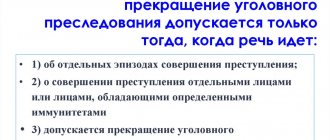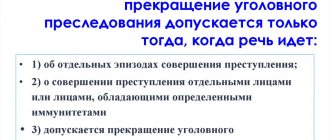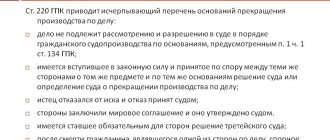New edition of Art. 239 Code of Criminal Procedure of the Russian Federation
1. In the cases provided for by paragraphs 3 - 6 of part one, part two of Article 24 and paragraphs 3 - 6 of part one of Article 27 of this Code, as well as in the event of a prosecutor’s refusal to charge in the manner established by part seven of Article 246 of this Code, the judge makes a resolution to terminate the criminal case.
2. A judge may also terminate a criminal case if there are grounds provided for in Articles 25 and 28 of this Code, at the request of one of the parties.
3. In a resolution to terminate a criminal case or criminal prosecution:
1) the grounds for termination of the criminal case and (or) criminal prosecution are indicated;
2) issues are resolved on the abolition of the preventive measure, as well as the seizure of property, correspondence, temporary removal from office, control and recording of negotiations;
3) the issue of material evidence is resolved.
4. A copy of the decision to terminate the criminal case is sent to the prosecutor, and is also handed to the person against whom the criminal prosecution has been terminated, and to the victim within 5 days from the date of its issuance.
5. If in a criminal case a decision was previously made on the use of security measures in the implementation of state protection, then the judge, simultaneously with the termination of the criminal case or criminal prosecution, makes a decision on the further application of security measures or on their complete or partial cancellation, if there are no security measures for the further application grounds provided for by the legislation of the Russian Federation, on the basis of information received from the body implementing security measures, or at the request of the body implementing security measures, or on the basis of a written application from the persons specified in Part 2 of Article 16 of Federal Law of August 20, 2004 N 119 -FZ “On State Protection of Victims, Witnesses and Other Participants in Criminal Proceedings”, which are subject to consideration within the established time frame. The body implementing security measures, as well as the person in respect of whom such a decision was made, is notified of the decision.
Another comment on Art. 239 of the Criminal Procedure Code of the Russian Federation
1. The judge makes a decision to terminate the criminal case if, based on the results of the preliminary hearing, it is established that there are grounds for terminating the criminal case or terminating the criminal prosecution provided for by the relevant provisions of Art. Art. 24 and 27 of the Code of Criminal Procedure of the Russian Federation.
2. At the request of one of the parties, the criminal case may be terminated by the court in the event of reconciliation of the parties (Article 25 of the Code of Criminal Procedure of the Russian Federation), in connection with a change in the situation (Article 26 of the Code of Criminal Procedure of the Russian Federation) or in connection with the active repentance of the defendant (Article 28 of the Code of Criminal Procedure of the Russian Federation ).
3. At the initiative of the court, a criminal case cannot be terminated due to the absence of a crime, the absence of corpus delicti in the act, or the non-involvement of the accused in the commission of a crime, since these issues are examined by the court during the trial and resolved in the verdict. However, in accordance with the adversarial principle, if the public prosecutor withdraws the charge, the case must be terminated precisely on this basis.
4. Unlike other decisions made by the court at the preliminary hearing stage, the decision to terminate a criminal case can be appealed to a higher court (Part 7 of Article 236 of the Code of Criminal Procedure of the Russian Federation).
Article 239 of the Code of Criminal Procedure of the Russian Federation. Termination of a criminal case or criminal prosecution (current version)
1. It seems that the judge at the preliminary hearing can dismiss the case on the grounds provided for in paragraphs 3 - 6, part 1, part 2 of Art. 24 and paragraphs 3 - 6, part 1, art. 27, as well as Art. Art. 25 - 26, 28. The absence of a crime at this stage of the process cannot serve as grounds for such termination (clause 1, part 1, article 24); absence of corpus delicti in the act (clause 2, part 1, article 24); non-involvement of the suspect or accused in the commission of a crime (clause 1, part 1, article 27). In these cases, an acquittal must be rendered, which requires a trial. In Part 1 of Art. 239 of the Code of Criminal Procedure also provides for the obligation of the court to terminate a criminal case on the grounds provided for in paragraphs 1 and 2 of part 1 of Art. 24 and paragraphs 1 and 2, part 1, art. 27, if the prosecutor abandoned the charge completely or in the relevant part (part 7 of article 246). However, the applicability of this norm already during the preliminary hearing is questionable, since according to the Resolution of the Constitutional Court of the Russian Federation, a court decision based on such a position of the public prosecutor is permissible only after completing a study of the relevant case materials and hearing the opinions of the participants in the court hearing on the part of the prosecution and defense. which is only conceivable at the trial stage. When a criminal case is terminated, as well as when proceedings on it are suspended, the judge at this stage has the right to evaluate evidence not only from the point of view of its admissibility, but also its relevance to the circumstances to be proven in the case, as well as reliability and sufficiency.
———————————
See: paragraph 3 of the Resolution of the Constitutional Court of the Russian Federation of December 8, 2003 N 18-P “In the case of verifying the constitutionality of the provisions of Art. Art. 125, 219, 227, 229, 236, 237, 239, 246, 254, 271, 378, 405 and 408, and ch. 35 and 39 of the Code of Criminal Procedure of the Russian Federation in connection with requests from courts of general jurisdiction and complaints from citizens” // RG. 12/23/2003.
In accordance with Part 2 of Art. 24 termination of a criminal case at a preliminary hearing is possible with decriminalization of the act, i.e. due to the absence of corpus delicti, when before the verdict entered into legal force, the criminality and punishability of this act were eliminated by a new criminal law. However, it is the judge's right to dismiss the case on this basis at the preliminary hearing. The court may also consider the merits of a criminal case pending before it if, before the verdict was pronounced, the criminality and punishability of the act charged to the accused was eliminated by the new criminal law. This does not deprive the accused of the right of access to justice and the right to effective judicial protection in the procedural forms established by law.
———————————
Determination of the Constitutional Court of the Russian Federation of November 5, 2004 N 361-O “On the complaint of gr. Filippov Vladimir Timofeevich for violation of his constitutional rights by part two of Art. 24, part four of Art. 133, art. 239 and paragraph 1 of Art. 254 Code of Criminal Procedure of the Russian Federation” // Bulletin of the Constitutional Court of the Russian Federation. 2005. N 2.
2. It seems that the judge has the right to terminate only the criminal case (including in a certain part of it), and not the criminal prosecution, because only the criminal prosecutor can terminate the prosecution.
———————————
On the fundamental possibility of partial termination of a criminal case in Russian criminal proceedings, see: paragraph 2, part 4, art. 163 Code of Criminal Procedure.
3. Termination of a criminal case is the only type of decision in which the judge at this stage has the right to evaluate evidence not only from the point of view of its admissibility, but also its relevance to the circumstances to be proven in the case, reliability and sufficiency. It seems that in this case, by analogy with Part 3 of Art. 235, during the preliminary hearing, the judge may question witnesses and attach to the case the necessary documents presented by the parties.
Comment source:
Ed. A.V. Smirnova “COMMENTARY ON THE CRIMINAL PROCEDURE CODE OF THE RUSSIAN FEDERATION” (ARTICLE BY ARTICLE), 5th edition
SMIRNOV A.V., KALINOVSKY K.B., 2009
Preliminary hearing in criminal proceedings
The hearing in a criminal case is conducted on the basis of Art. 229 of the Code of Criminal Procedure of the Russian Federation, if:
- a motion has been filed to exclude evidence;
- there are grounds for suspending or terminating the proceedings, returning materials to the prosecutor’s office;
- a petition has been filed for consideration without the participation of a defendant who is located outside the Russian Federation or who is avoiding appearing in court if he has not been prosecuted in the territory of another state;
- a motion was made for a jury trial;
- there are grounds for separating a criminal case;
- a petition has been filed to join several criminal cases;
- there is a suspended sentence of a person for a previously committed crime that has not entered into force.
Note! A request to schedule such a hearing is submitted by the defendant’s lawyer within three days after familiarization with the materials or indictment.
Conducting a hearing is possible in compliance with the specifications established by Art. 234 Code of Criminal Procedure of the Russian Federation:
Criminal Procedure Code of the Russian Federation:
Article 239. Termination of a criminal case or criminal prosecution
1. In the cases provided for by paragraphs 3 - 6 of part one, part two of Article 24 and paragraphs 3 - 6 of part one of Article 27 of this Code, as well as in the event of a prosecutor’s refusal to charge in the manner established by part seven of Article 246 of this Code, the judge makes a resolution to terminate the criminal case.
2. A judge may also terminate a criminal case if there are grounds provided for in Articles 25 and this Code, at the request of one of the parties.
3. In a resolution to terminate a criminal case or criminal prosecution:
1) the grounds for termination of the criminal case and (or) criminal prosecution are indicated;
2) issues are resolved on the abolition of the preventive measure, as well as the seizure of property, correspondence, temporary removal from office, control and recording of negotiations;
3) the issue of material evidence is resolved.
4. A copy of the decision to terminate the criminal case is sent to the prosecutor, and is also handed to the person against whom the criminal prosecution has been terminated, and to the victim within 5 days from the date of its issuance.
5. If in a criminal case a decision was previously made on the use of security measures in the implementation of state protection, then the judge, simultaneously with the termination of the criminal case or criminal prosecution, makes a decision on the further application of security measures or on their complete or partial cancellation, if there are no security measures for the further application grounds provided for by the legislation of the Russian Federation, on the basis of information received from the body implementing security measures, or at the request of the body implementing security measures, or on the basis of a written application from the persons specified in Part 2 of Article 16 of Federal Law of August 20, 2004 N 119 -FZ “On State Protection of Victims, Witnesses and Other Participants in Criminal Proceedings”, which are subject to consideration within the established time frame. The body implementing security measures, as well as the person in respect of whom such a decision was made, is notified of the decision.
Return to the table of contents of the document: Criminal Procedure Code of the Russian Federation in the current edition
Everything about criminal cases
Go to the text of the Code of Criminal Procedure
Url Additional information:
Procedure for conducting a preliminary hearing
- part 1 234 of the Code of Criminal Procedure
one judge alone, in closed session
- Part 2 234 Code of Criminal Procedure
notification of the parties within 3 days
- Part 3 234 Code of Criminal Procedure
the preliminary hearing may take place in the absence of the accused
- Part 4 234 Code of Criminal Procedure
Failure of participants (except the accused) to appear does not prevent
Motion to exclude evidence
- Part 5 234 Code of Criminal Procedure
if there are no objections from the other party, satisfaction
- Part 7 234 Code of Criminal Procedure
defense motion for evidence
- Part 8 234 Code of Criminal Procedure
request to examine witnesses
- Part 9 234 Code of Criminal Procedure
minutes are kept at the preliminary hearing
Arguments and final word at the preliminary hearing
At the preliminary hearing
no debate and no last word
Article 234 of the Code of Criminal Procedure. Procedure for conducting a preliminary hearing
1) The preliminary hearing is conducted by a judge:
- alone;
- in a closed court session;
— with the participation of the parties;
- in compliance with the requirements of Chapters 33, 35, 36 of the Criminal Procedure Code with the exceptions established by Chapter 34 of the Criminal Procedure Code.
Url Additional information:
— P.
Plenum No. 23 in a jury trial, hearing no earlier than 7 days from delivery
2) Notification of summoning the parties to a court hearing must be sent at least 3 days before the date of the preliminary hearing.
Url Additional information:
- paragraph 17
Plenum No. 28, in the absence of the defendant, a lawyer is required
3) A preliminary hearing may be held in the absence of the accused:
- at his request,
- or if there are grounds for conducting a trial in the manner prescribed by Part 5 247 of the Code of Criminal Procedure, at the request of one of the parties.
Url Additional information:
- paragraph 16
Plenum No. 28 failure to appear at the preliminary hearing
4) The failure of other timely notified participants in criminal proceedings to appear does not prevent the preliminary hearing.
Url Additional information:
— clause 12
Plenum No. 28 exclusion of evidence
5) If a party files a motion to exclude evidence:
- the judge finds out from the other party whether she has any objections to this petition;
- if there are no objections, the judge grants the petition and issues a ruling to schedule a court hearing, unless there are other grounds for holding a preliminary hearing.
6) Lost power.
7)
The defense’s request for additional evidence or items must be granted if the evidence and items are relevant to the criminal case.
Url Additional information:
— clause 12
Plenum No. 28 interrogation of a witness when a motion is excluded
 At the request of the parties, any persons who know anything about the circumstances of the investigative actions or the seizure and inclusion of documents in the criminal case, with the exception of persons with witness immunity, may be questioned as witnesses.
At the request of the parties, any persons who know anything about the circumstances of the investigative actions or the seizure and inclusion of documents in the criminal case, with the exception of persons with witness immunity, may be questioned as witnesses.
9) During the preliminary hearing, a record is kept.
Return to the text of the Code of Criminal Procedure
Seek advice
Suspension of criminal proceedings by the court
Article 238 of the Code of Criminal Procedure of the Russian Federation provides for cases when a judge must issue a decision to suspend proceedings in a criminal case. Such cases include:
- the accused fled and his whereabouts are unknown;
- the accused is seriously ill, and this fact is confirmed by a medical report;
- the court sent a request to the Constitutional Court of the Russian Federation or the Constitutional Court of the Russian Federation accepted for consideration complaints about the compliance of the law applied or to be applied in this criminal case with the Constitution of the Russian Federation;
- the location of the accused is known, but it is not possible to ensure a real possibility of his participation in the trial of the case;
- the accused fled from court (for example, the accused, while in custody, escaped). In this case, the judge returns the criminal case to the prosecutor and instructs him to search for him.





